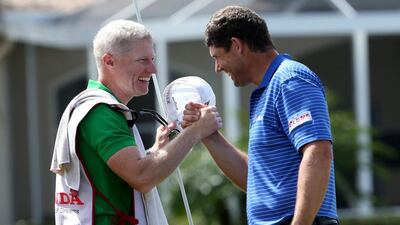When Padraig Harrington was at the peak of his powers, becoming the first in a series of players from the Emerald Isle to collect major titles in bunches, there was a running joke that circulated through some corners of the golf world.
After winning his third major, in 2008, Harrington was more popular back home in Ireland than U2 frontman Bono, one of the world's biggest rock stars.
A stretch, you say? Perhaps not.
When Harrington won the Honda Classic in stunning fashion on Monday, his first notable victory in seven years, he was trending on Twitter in the United States, cracking the top 10 at midday, minutes after he beat rookie Daniel Berger in a play-off to complete an improbable victory that nobody saw coming.
Once again, the universally popular Harrington has them talking.
Harrington, who once climbed as high as third in the world rankings, had crashed to No 385 last November and entered the Honda Classic at a humbling 297th.
He was playing on a sponsor exemption, testament to his popularity, not necessarily his form.
While all eyes when the week began were on world No 1 Rory McIlroy, who missed the cut, ultimately it was another man of Irish blood who stole the show, and it ranked as one of the sport’s most well-received wins in years.
Few, if any, players are more likeable than the chatty and analytical Harrington, 43, a former accountant, the quirky son of a policeman, and one of the greatest interviews in the game.
A moment after he earned a return to the Masters by winning on the second hole of the play-off with Berger – Harrington was not eligible to play at Augusta last year because his game had fallen off so badly – the TV networks thrust a camera in his grinning face.
“There’s no doubt, on the way back down, it’s a lot different,” Harrington said.
His bounce back began, albeit in largely anonymous fashion, late last year, when he won an obscure Asian Tour event to garner a scant 14 world-ranking points against a weak field.
But winning at any level counts for something when a player’s confidence has all but disappeared.
“I went from the penthouse …” Harrington said, pausing.
Think you know the rest? Like with the direction of the game in 2008, guess again.
“… to, well, a very nice hotel room.”
True enough, given his place in the game and the regard in which he is held, he never came close to seeing rock bottom, at least financially.
But as far as his performance, the results were abysmal.
An inveterate and unapologetic tinkerer, Harrington is constantly tweaking and torquing his swing, and is forever showing up on the practice range with bizarre swing aids.
He hits drivers one-handed. He steps back from the ball and lunges into it like a baseball batter or cricketer. He was spotted at the Honda wearing a large rubber band around the lower part of his body. Whether his incessant search for perfection has been a help or hindrance has rightly been a hot topic among his legion of fans.
Regardless, his win on Monday was truly the stuff of memories.
He was five back with eight holes to play, then birdied holes 11 through 14 to climb into the mix.
As 2014 Ryder Cuppers such as Ian Poulter and Patrick Reed dunked balls into the water, Harrington became the first player in five years to win a PGA Tour event while playing on a sponsor exemption.
It had been aeons in the making. His last sanctioned win on either the European or US tour came at the 2008 PGA Championship, the last of his three major titles.
Not a soul could have envisioned the deterioration in his game over the ensuing span, which included a case of the putting yips in 2012.
After finally finding the winner’s circle, perhaps Harrington, who is so deep into mental-game aspects of the sport that it might have driven him a bit bananas, will stop the never-ending overhauls.
He seems to finally grasp that, sometimes, addition results in subtraction.
“My big problem is really trying to control the outcome and not settling for the process being enough,” he said. “Ultimately, I have found out that is the biggest hindrance to my game.”
sports@thenational.ae

